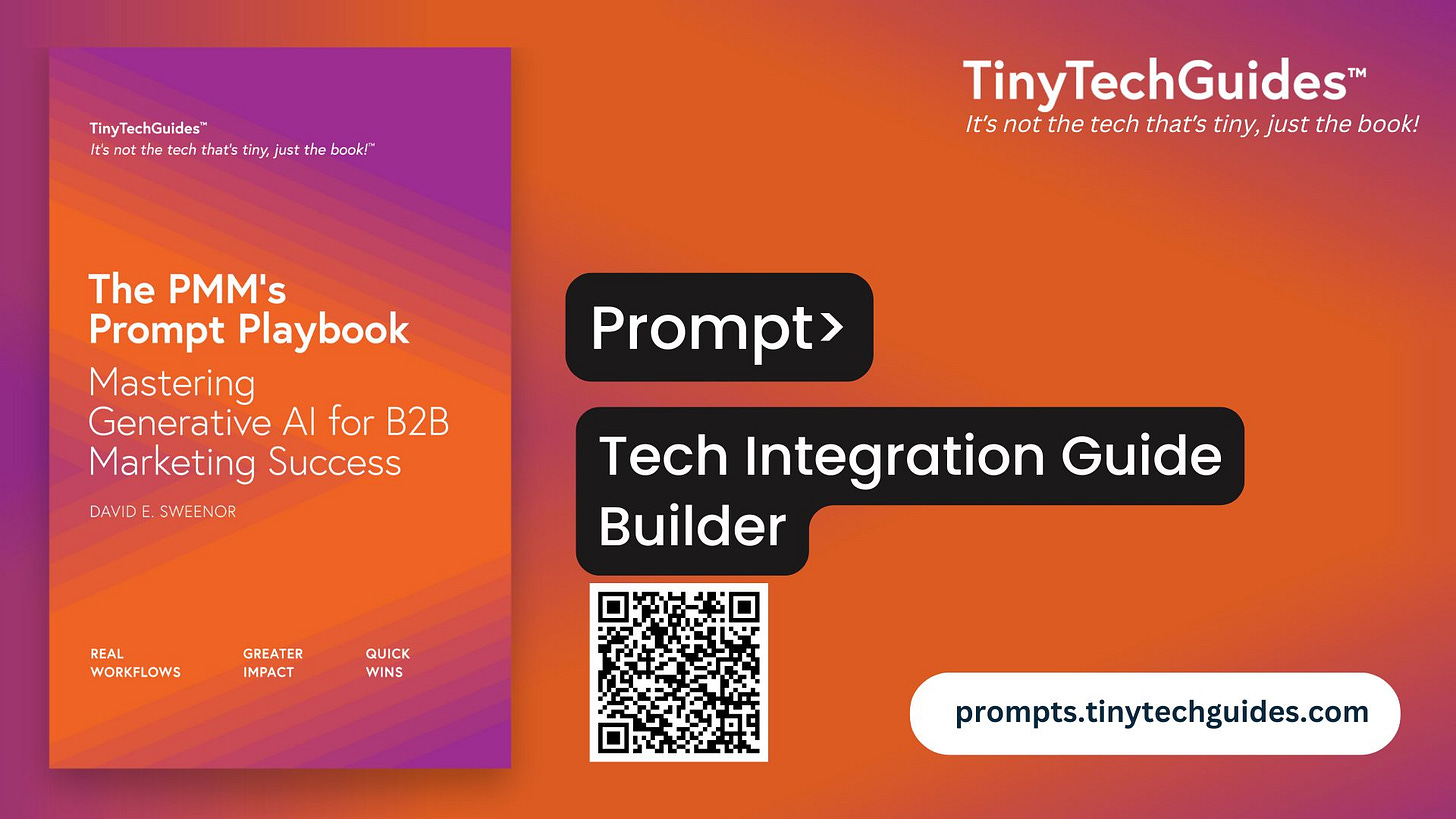Integration Doesn’t Have to Be Painful
A repeatable process for building guides that make connecting platforms and cloud services clear, fast, and frustration-free.
Workflow Name: Technical Integration Guide Builder
Created by prompts.tinytechguides.com
This prompt is part of The PMM’s Prompt Playbook which has 30 ready-to-use prompts. If you're looking for more cut-and-paste prompts, join the Substack! Paid subscribers receive new cut-and-paste prompts every week.
Get the PMM’s Prompt Playbook and Modern B2B Marketing today!
Need help with product marketing or prompts? Let me know.
What this Workflow Does
This workflow produces detailed, user-friendly technical integration guides that help customers successfully connect your platform with key services and cloud environments. It provides step-by-step instructions, tested code samples, and visual aids to reduce complexity and improve implementation success. Designed for repeatable use across multiple scenarios, this workflow ensures a consistent and seamless integration experience.
Workflow Steps Summary
Step 1: Identify integration scenarios and platforms
Step 2: Develop step-by-step instructions for each integration
Step 3: Add code samples and configurations
Step 4: Include screenshots and diagrams to improve clarity
Step 5: Validate guides via testing and user feedback
Step 0: Define Inputs
{platform_name} = Your product/platform name
{integration_services} = List of third-party tools (e.g., Salesforce, Snowflake, Databricks)
{cloud_providers} = List of supported cloud environments (e.g., AWS, Google Cloud, Azure)
{target_audience} = Who will be using these guides (e.g., data engineers, system admins)
{preferred_languages} = Code languages used in the guides (e.g., Python, SQL, YAML)
{documentation_format} = Preferred output format (e.g., Markdown, HTML, PDF)
{feedback_channels} = How users will give feedback (e.g., support tickets, GitHub issues)
Step 1: Identify Integration Scenarios
Goal: Define the specific third-party services and cloud platforms that need dedicated guides.
#Role
You are a solutions architect responsible for defining and documenting integration requirements for customer deployments.
#Context
The {platform_name} needs to support integration with these services: {integration_services}, and deployment on these cloud platforms: {cloud_providers}. The guides are intended for {target_audience}.
#Task
List each integration scenario as a title with a short description (1-2 sentences) of what the user will accomplish. Separate service integrations from cloud deployments.
#Format
Use bullet points under two headings: “Service Integrations” and “Cloud Deployments.”
#Tone
Concise and technical, with clarity on use cases.
Step 2: Write Step-by-Step Instructions
Goal: Create clear and actionable implementation steps for each integration.
#Role
You are a technical writer documenting product integrations for enterprise users.
#Context
You are writing integration guides for {platform_name} with {integration_services} and deployment on {cloud_providers}. Your audience is {target_audience}, and they expect accurate, clear, and modular instructions.
#Task
For each scenario, write step-by-step instructions (at least 5 steps). Cover prerequisites, configuration, execution, and validation.
#Format
Use numbered lists for each guide. Include subheadings like “Overview,” “Prerequisites,” “Configuration Steps,” and “Validation.”
#Tone
Clear, instructional, and technical with a professional but accessible tone.



